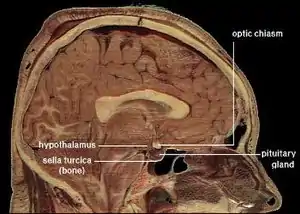Hypothalamus
The hypothalamus is a brain part at the base of the brain. It connects the endocrine system to the nervous system. The word hypothalamus is a Greek word which means "under the thalamus"; it is used because hypothalamus is below the thalamus, and above the brain stem.

The hypothalamus controls body temperature, hunger, thirst and circadian cycles. It is the control system which regulates the pituitary gland, the 'master gland' of the body. It is also involved in regulating sex drive.[1]
The thalamus sits above the hypothalamus, and the hypothalamus sits above the pituitary gland. That area at the base of the brain down to the pituitary is the centre of neurosecretion. Some neurosecretory cells of the hypothalamus produce hormones such as oxytocin and vasopressin. These hormones are released into the blood in the posterior pituitary.[2] It is the main way the nervous system controls the hormones in our bodies.
References
- LeVay, Simon (2017). Gay, Straight, and the Reason why: The Science of Sexual Orientation. Oxford University Press. pp. ix. ISBN 978-0-19-029737-4.
- Melmed S. et al 2011. Williams textbook of endocrinology. 12th ed, Saunders. pp. 107. ISBN 978-1437703245
| Endocrine system |
| Adrenal gland - Corpus luteum - Hypothalamus - Ovaries - Pancreas - Parathyroid gland - Pineal gland - Pituitary gland - Testes - Thyroid gland - Hormone |